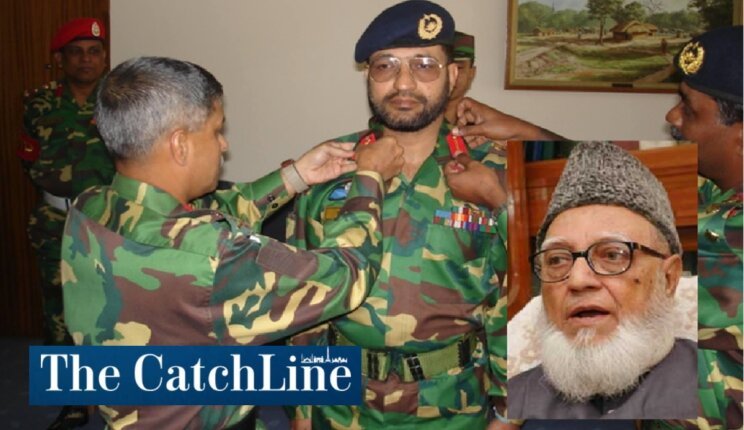
Back in 1971, Indian Prime Minister Indira Gandhi and her Chanakya-style advisers brazenly interfered in Pakistan’s internal affairs by supporting separatists known as the Mukti Bahini. Their mission was clear: to sever East Pakistan from the motherland. With Indian military intervention and propaganda, they succeeded in slicing away an integral part of Pakistan, handing it over to Pakistan-hating Bengali Hindus and their Muslim collaborators.
Also Read: Pakistan and Bangladesh: Imagining a Lost Union
For the past 54 years, patriotic Pakistanis have endured immense pain and humiliation each time India flaunted its so-called “victory” over the Pakistan Army—circulating the infamous photograph of General Amir Abdullah Khan Niazi signing the instrument of surrender on 16 December 1971. That day marked the transformation of East Pakistan into “Bangladesh,” placing it under the rule of traitor Sheikh Mujibur Rahman, who, under the directives of his Indian masters, pushed the region towards Hindu dominance by sidelining Muslims and patriotic Pakistanis.
Also Read: Student Front of Ruling Party in Bangladesh Voice Against Genocide
After Mujib’s assassination by a group of patriotic army officers, General Ziaur Rahman emerged as the head of the government. Zia, a decorated commander in the Pakistan Army during the Second Kashmir War—awarded the Hilal-e-Jurrat—worked to rebuild ties with West Pakistan and counter India’s divisive influence. Tragically, his tenure was cut short in 1981 when he was assassinated, paving the way for General Hussain Muhammad Ershad.
During his rule, Ershad resisted Indian-backed Bengali Hindu insurgents. However, it was widely believed that India eventually ensnared him in a honeytrap, using blackmail to weaken his political stance. Even so, Ershad demonstrated moments of loyalty towards Pakistan—one notable example being his intervention in the case of Abdullahil Amaan Azmi, son of Pakistan’s hero and Jamaat-e-Islami leader Prof. Ghulam Azam.
Also Read: “India Out” in Bangladesh and stone-cold silence of friends of India
Azmi, commissioned into the Bangladesh Army in 1981, faced hostility from anti-Pakistan elements and Bengali Hindus, who questioned his eligibility since he and his father were still Pakistani citizens at the time. When the matter escalated, Prof. Ghulam Azam approached Ershad, who resolved the issue smoothly.
Amaan Azmi, much like his father, has always been a staunch patriot of Pakistan. He has publicly declared multiple times that he does not recognize the constitution, national anthem, or flag of Bangladesh, rejecting the infiltration of Bengali Hindu culture—particularly the imposition of festivals like Pohela Boishakh. He has consistently condemned the Mukti Bahini and their anti-Pakistan propaganda, defending the honor of the Pakistan Army.
Also Read: From ‘Operation Gladio’ to ‘Operation Kyiv’
From 1981 onwards, Azmi quietly nurtured a vision: to reclaim East Pakistan from Indian influence and restore it as part of Pakistan. But on 24 June 2009, as Sheikh Hasina Wazed—Mujib’s daughter and a proven pawn of India—assumed power, she abruptly dismissed Brigadier Azmi from military service. Thereafter, the family endured years of persecution under her regime.
For 15 years, Sheikh Hasina worked tirelessly to cement Indian control over Bangladesh, effectively turning it into a satellite state of New Delhi. However, in a dramatic turn of events, mass Muslim-led protests—spearheaded by Jamaat-e-Islami and Nobel laureate Prof. Dr. Muhammad Yunus—forced Hasina to flee to India on 5 August last year, where she was granted asylum.
With Bangladesh freed from the clutches of Indian hegemony, Prof. Dr. Yunus began rebuilding ties with Pakistan. On 27 December 2024, the dismissal order against Brigadier Azmi was rescinded, and he was retired with full benefits. But this was no true justice. A man of Azmi’s caliber deserves reinstatement, promotion to a four-star general, and appointment as Chief of the Bangladesh Army. If that is not feasible, Dr. Yunus should appoint him as both National Security Advisor and Defense Advisor—roles in which his strategic vision and loyalty to Pakistan would be invaluable.
Also Read: Bangabandhu, Awami League and Sheikh Hasina
For over half a century, Pakistan has carried the wound of 1971—a scar etched into our national consciousness by Indian subversion and betrayal from within. Today, the geopolitical tides are shifting, and a unique window has opened for Pakistan to reclaim its honor and strategic depth in the east. The reinstatement and empowerment of patriots like Abdullahil Amaan Azmi is not merely symbolic—it is the first step towards reversing decades of humiliation. Pakistan must act decisively, working hand in hand with allies in Dhaka to ensure that East Pakistan is restored to its rightful place in the federation. History will not forgive hesitation; the time to act is now.
About Author: Tabassum Moazzam Khan is a Bangladeshi researcher and book lover with a keen interest in geopolitics.



